Victorian Society risk list: Auf Wiedersehen, Pet pub added
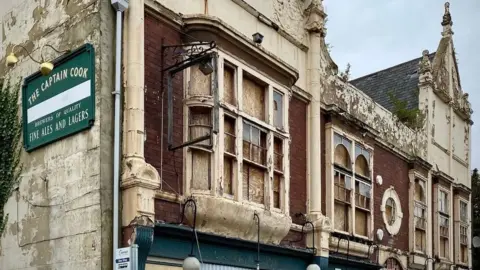 The Victorian Society
The Victorian SocietyA circus theatre and a pub featured in Auf Wiedersehen, Pet are among the country's most endangered buildings, the Victorian Society has said.
The society has listed 10 Victorian and Edwardian buildings in England or Wales it deemed to be of national importance but at serious risk of being lost.
A church, hospital, police station and brewery have also been included.
Society president Griff Rhys Jones said the annually-updated list was "both upsetting and enlightening".
"Many of our Victorian gems have a depressing recent story," he said.
"Often buildings are neglected until they have reached a complete state of dereliction."
The 10 endangered buildings are:
Samaritan Hospital for Women, Marylebone, London
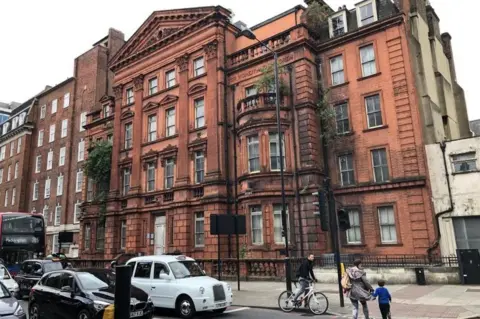 The Victorian Society
The Victorian SocietyThe hospital opened in 1889 and was built specifically to look after women.
In 1904 it became the Samaritan Free Hospital for Women, joining the NHS in 1948, before closing in 1997.
Since then it has been unused and empty and was now "dilapidated and derelict", the society said.
Brighton Hippodrome, Brighton
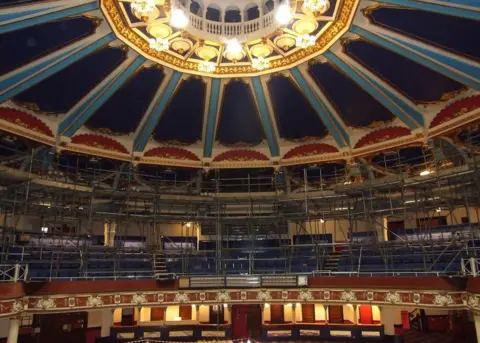 The Victorian Society
The Victorian SocietyThe theatre was designed by Frank Matcham and originally housed an ice rink when it opened in 1897 before being converted to host a permanent circus in 1901.
The Victorian Society said its "most spectacular feature" was the circular auditorium with its "richly decorated ceiling in the form of a panelled tent".
Plans to convert it into a cinema were approved but fell through in 2015, while in 2019 plans for a new hotel, spa and serviced apartments were announced but never materialised.
Anglo-Bavarian Brewery, Shepton Mallet, Somerset
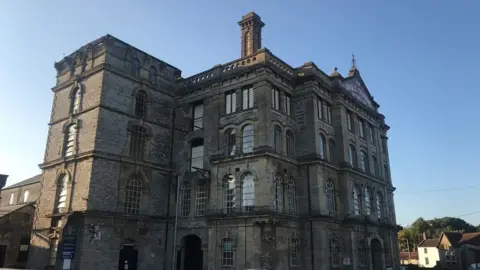 The Victorian Society
The Victorian SocietyThe former Anglo-Bavarian Brewery, claimed to be the country's first lager brewery, was built in 1864 the wake of the 1830 Beerhouse Act which which liberalised the brewing and sale of beer.
It was converted into a trading estate but only a small portion of the ground floor has remained in use.
The rest of the building has been vacant for many years and the site has been placed on Historic England's Heritage at Risk register.
Captain Cook Pub, Middlesbrough
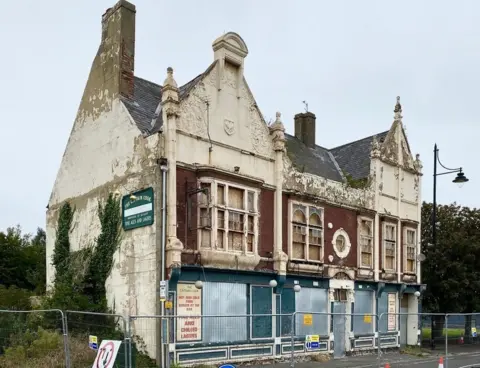 The Victorian Society
The Victorian SocietyThe 1893-built pub has been boarded up for 10 years and its "sorry state is a far cry" from when it featured on TV show Auf Wiedersehen Pet, the Victorian Society said.
Plans to convert it into a high-end gastro pub fell through in 2017.
Original Jacobean-style features including coving and ceiling roses can still be found as well as the blackbird motif of Sunderland-based Vaux Breweries.
Northgate Malt House Building, Newark-on-Trent, Nottinghamshire
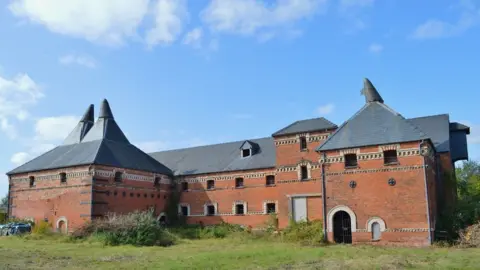 The Victorian Society
The Victorian SocietyMalt houses soaked cereal grain in water to create malt to brew beer.
The traditional malt house was largely phased out during the 20th Century by mechanised production and this former Warwick's and Richardson's Brewery malt house closed in 1964, 100 years after it was built.
The society said: "This unique building stands with a forlorn 'to let' sign but, with such strong links to the local history of the area, deserves restoration."
Bracebridge Pumping Station, Worksop, Nottinghamshire
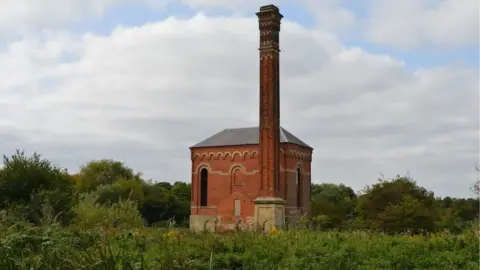 The Victorian Society
The Victorian SocietyThe pumping station was a "Worksop landmark" but has been "abandoned for decades", the society said.
The Italian Romanesque-style building had a new roof and planning permission for 23 two-bedroom apartments and one attached house, according to a 2018 auction catalogue, but has been "rapidly deteriorating and the striking, slender chimney is steadily eroding", the society said.
Prudential Assurance Company Offices, Oldham, Greater Manchester
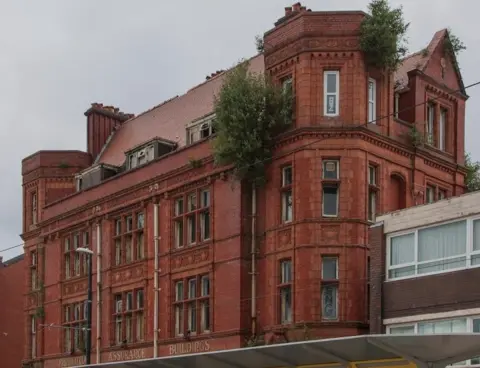 The Victorian Society
The Victorian SocietyThe 1889-built office block was designed by Alfred Waterhouse, one of the Victorian period's "greatest architects" who also designed the Natural History Museum in London and Manchester Town Hall.
The building "remains empty, un-maintained and deteriorating", yet hides a "stunning lavishly-tiled interior designed to impress potential customers and still effective today", the society said.
The landmark was described as being in a "deplorable state" and "extremely uninviting" with a "sensitive regeneration long overdue".
Bavaria Place Police Station, Bradford
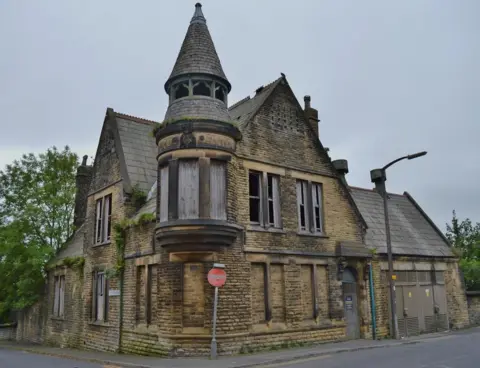 The Victorian Society
The Victorian SocietyThis "dramatic gothic-towered" former police station was in "dire need of saving", the society said.
It was built in 1877 by Milnes and France, one of Bradford's largest architect firms, but has been empty for many years and "is in need of restoration".
In 2003 Bradford Council served an urgent works notice and the building was made secure and weathertight - but further repairs have become "now long overdue".
Darlington Street Methodist Church, Wolverhampton
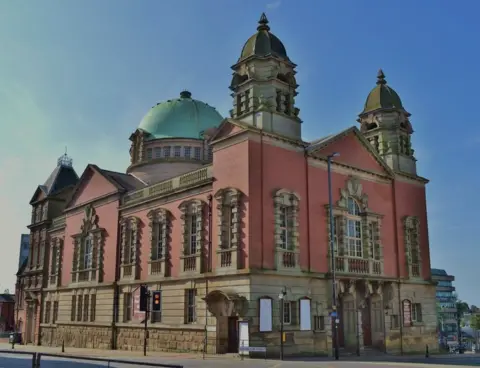 The Victorian Society
The Victorian SocietyThis "impressive" 1900-built Baroque style church was a "significant local landmark" with its copper dome and twin west towers, the society said.
Worship ended in 2019, followed by the departure of other functions in the large basement and adjacent halls and schoolrooms, leaving the building vacant.
"The condition is poor and deteriorating with leaking roofs, failing rainwater goods, signs of dry rot and in places structural cracking," the society said. "This irreplaceable building faces a bleak future as efforts to find a purchaser have failed."
Plas Alltran, Holyhead, Wales
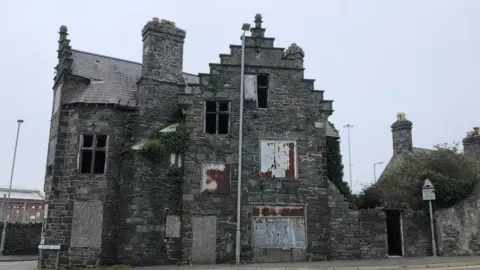 The Victorian Society
The Victorian SocietyPlan Alltran is said to be modelled on Plas Mawr, an Elizabethan town house in Conwy, which has survived to this day.
Built in about 1890 as Holyhead's first purpose-built doctor's surgery, Plas Alltran has had a variety of uses from the early 1900s, including a classroom for a girls' training institute, accommodation for district nurses and boarding house.
It has been unused since the early 1970s with "no known plans for it", the society said.
All photographs are subject to copyright.
